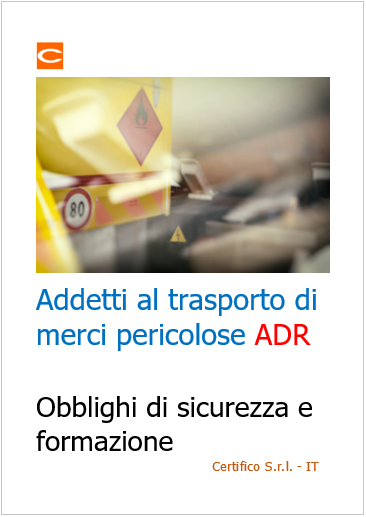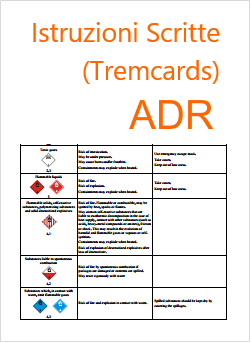// Documenti disponibili n: 46.525
// Documenti scaricati n: 36.532.154
THE CONTRACTING PARTIES,
DESIRING to increase the safety of international transport by road,
HAVE AGREED as follows:
Article 1
For the purpose of this Agreement,
(a) the term "vehicle" shall mean motor vehicles, articulated vehicles, trailers and semi-trailers, as defined in article 4 of the Convention on Road Traffic of 19 September 1949, other than vehicles belonging to or under the orders of the armed forces of a Contracting Party;
(b) the term "dangerous goods" shall mean those substances and articles the international carriage by road of which is prohibited by, or authorized only on certain conditions by, Annexes A and B;
(c) the term "international transport" shall mean any transport operation performed on the territory of at least two Contracting Parties by vehicles defined in (a) above.
Article 2
1. Subject to the provisions of article 4, paragraph 3, dangerous goods barred from carriage by Annex A shall not be accepted for international transport.
2. International transport of other dangerous goods shall be authorized subject to compliance with: (a) the conditions laid down in Annex A for the goods in question, in particular as regards their packaging and labelling, and (b) the conditions laid down in Annex B, in particular as regards the construction, equipment and operation of the vehicle carrying the goods in question, subject to the provisions of article 4, paragraph 2.
Article 3
The Annexes to this Agreement shall form an integral part thereof.
Article 4
1. Each Contracting Party shall retain the right to regulate or prohibit, for reasons other than safety during carriage, the entry of dangerous goods into its territory.
2. Vehicles in service on the territory of a Contracting Party at the time of entry into force of this Agreement or brought into service on such territory within two months after its entry into force shall be allowed, for a period of three years from such entry into force, to perform the international transport of dangerous goods even if their construction and equipment do not entirely conform to the requirements laid down in Annex B for the transport operation in question. Under special clauses of Annex B, however, this period may be reduced.
3. The Contracting Parties shall retain the right to arrange, by special bilateral or multilateral agreements, that certain of the dangerous goods which under this Agreement are barred from all international transport may, subject to certain conditions, be accepted for international transport on their territories, or that dangerous goods which under this Agreement are acceptable for international transport only on specified conditions may be accepted for international transport on their territories under conditions less stringent than those laid down in the Annexes to this Agreement. The special bilateral or multilateral agreements referred to in this paragraph shall be communicated to the Secretary-General of the United Nations, who shall communicate them to the Contracting Parties which are not signatories to the said agreements.
Article 5
The transport operations to which this Agreement applies shall remain subject to national or international regulations applicable in general to road traffic, international road transport and international trade.
Article 6
1. Countries members of the Economic Commission for Europe and countries admitted to the Commission in a consultative capacity under paragraph 8 of the Commission's terms of reference may become Contracting Parties to this Agreement.
(a) by signing it;
(b) by ratifying it after signing it subject to ratification;
(c) by acceding to it.
2. Such countries as may participate in certain activities of the Economic Commission for Europe in accordance with paragraph 11 of the Commission's terms of reference may become Contracting Parties to this Agreement by acceding to it after its entry into force.
3. The Agreement shall be open for signature until 15 December 1957. Thereafter, it shall be open for accession.
4. Ratification or accession shall be effected by the depositing of an instrument with the Secretary-General of the United Nations.
Article 7
1. This agreement shall enter into force one month after the date on which the number of countries mentioned in article 6, paragraph 1, which have signed it without reservation of ratification or have deposited their instruments of ratification or accession has reached a total of five. However, the Annexes thereto shall not apply until six months after the entry into force of the Agreement itself.
2. For any country ratifying or acceding to this Agreement after five of the countries referred to in article 6, paragraph 1, have signed it without reservation of ratification or have deposited their instruments of ratification or accession, this Agreement shall enter into force one month after the said country has deposited its instrument of ratification or accession and the Annexes thereto shall apply for the said country either on the same date, if they are already in force by that date, or, if they are not in force by that date, on the date on which they apply under the provisions of paragraph 1 of this article.
Article 8
1. Any contracting Party may denounce this Agreement by so notifying the Secretary-General of the United Nations.
2. Denunciation shall take effect twelve months after the date of receipt by the Secretary-General of the notification of denunciation.
Article 9
1. This Agreement shall cease to have effect if, after its entry into force, the number of Contracting Parties is less than five during twelve consecutive months.
2. In the event of the conclusion of a worldwide agreement for the regulation of the transport of dangerous goods, any provision of this Agreement which is contrary to any provision of the said worldwide agreement shall, from the date on which the latter enters into force, automatically cease to apply to relations between the Parties to this Agreement which become parties to the worldwide agreement, and shall automatically be replaced by the relevant provision of the said worldwide agreement.
Article 10
1. Any country may, at the time of signing this Agreement without reservation of ratification or of depositing its instrument of ratification or accession or at any time thereafter, declare by notification addressed to the Secretary-General of the United Nations that this Agreement shall extend to all or any of the territories for the international relations of which it is responsible. The Agreement and the annexes thereto shall extend to the territory or territories named in the notification one month after it is received by the Secretary-General.
2. Any country which has made a declaration under paragraph 1 of this article extending this Agreement to any territory for whose international relations it is responsible may denounce the Agreement separately in respect of the said territory in accordance with the provisions of article 8.
Article 11
1. Any dispute between two or more Contracting Parties concerning the interpretation or application of this Agreement shall so far as possible be settled by negotiation between them.
2. Any dispute which is not settled by negotiation shall be submitted to arbitration if any one of the Contracting Parties in dispute so requests and shall be referred accordingly to one or more arbitrators selected by agreement between the Parties in dispute. If within three months from the date of the request for arbitration the Parties in dispute are unable to agree on the sele ction of an arbitrator or arbitrators, any of those Parties may request the Secretary-General of the United Nations to nominate a single arbitrator to whom the dispute shall be referred for decision.
3. The decision of the arbitrator or arbitrators appointed under paragraph 2 of this article shall be binding on the Contracting Parties in dispute.
Article 12
1. Each Contracting Party may, at the time of signing, ratifying, or acceding to, this Agreement, declare that it does not consider itself bound by article 11. Other Contracting Parties shall not be bound by article 11 in respect of any Contracting Party which has entered such a reservation. 2. Any Contracting Party having entered a reservation as provided for in paragraph 1 of this article may at any time withdraw such reservation by notifying the Secretary-General of the United Nations.
Article 13
1. After this Agreement has been in force for three years, any Contracting Party may, by notification to the Secretary-General of the United Nations, request that a conference be convened for the purpose of reviewing the text of the Agreement. The Secretary-General shall notify all Contracting Parties of the request and a review conference shall be convened by the Secretary-General if, within a period of four months following the date of notification by the Secretary-General, not less than one-fourth of the Contracting Parties notify him of their concurrence with the request.
2. If a conference is convened in accordance with paragraph 1 of this article, the Secretary-General shall notify all the Contracting Parties and invite them to submit within a period of three months such proposals as they may wish the Conference to consider. The Secretary-General shall circulate to all Contracting Parties the provisional agenda for the conference, together with the texts of such proposals, at least three months before the date on which the conference is to meet.
3. The Secretary-General shall invite to any conference convened in accordance with this article all countries referred to in article 6, paragraph 1, and countries which have become Contracting Parties under article 6, paragraph 2.
Article 14 *
1. Independently of the revision procedure provided for in article 13, any Contracting Party may propose one or more amendments to the Annexes to this Agreement. To that end it shall transmit the text thereof to the Secretary-General of the United Nations. The Secretary-General may also propose amendments to the Annexes to this Agreement for the purpose of ensuring concordance between those Annexes and other international agreements concerning the carriage of dangerous goods.
2. The Secretary-General shall transmit any proposal made under paragraph 1 of this article to all Contracting Parties and inform thereof the other countries referred to in article 6, paragraph 1.
3. Any proposed amendment to the Annexes shall be deemed to be accepted unless, within three months from the date on which the Secretary-General circulates it, at least one-third of the Contracting Parties, or five of them if one-third exceeds that figure, have given the Secretary-General written notification of their objection to the proposed amendment. If the amendment is deemed to be accepted, it shall enter into force for all the Contracting Parties, on the expiry of a further period of three months, except in the following cases:
(a) In cases where similar amendments have been or are likely to be made to the other international agreements referred to in paragraph 1 of this article, the amendment sha ll enter into force on the expiry of a period the duration of which shall be determined by the Secretary-General in such a way as to allow, wherever possible, the simultaneous entry into force of the amendment and those that have been made or are likely to be made to such other agreements; such period shall not, however, be of less than one month's duration;
(b) The Contracting Party submitting the proposed amendment may specify in its proposal, for the purpose of entry into force of the amendment, should it be accepted, a period of more than three months' duration.
4. The Secretary-General shall, as soon as possible, notify all Contracting Parties and all the countries referred to in article 6, paragraph 1, of any objection which may be received from the Contracting Parties to a proposed amendment.
_________________________
* The text of Article 14, paragraph 3 incorporates a modification which entered into force on 19 April 1985 in accordance with a Protocol transmitted to Contracting Parties under cover of Depositary Notification C.N.229.1975.TREATIES-8 of 18 September 1975.
_________________________
5. If the proposed amendment to the Annexes is not deemed to be accepted, but if at least one Contracting Party other than the Contracting Party which proposed the amendment has given the Secretary-General written notification of its agreement to the proposal, a meeting of all the Contracting Parties and all the countries referred to in article 6, paragraph 1, shall be convened by the Secretary-General within three months after the expiry of the period of three months within which, under paragraph 3 of this article, notification must be given of objection to the amendment. The Secretary-General may also invite to such meeting representatives of:
(a) intergovernmental organizations which are concerned with transport matters; (b) international non-governmental organizations whose activities are directly related to the transport of dangerous goods in the territories of the Contracting Parties.
6. Any amendment adopted by more than half the total number of Contracting Parties at a meeting convened in accordance with paragraph 5 of this article shall enter into force for all Contracting Parties in accordance with the procedure agreed at such meeting by the majority of the Contracting Parties attending it.
Article 15
In addition to the notifications provided for in articles 13 and 14, the Secretary-General of the United Nations shall notify the countries referred to in article 6, paragraph 1, and the countries which have become Contracting Parties under article 6, paragraph 2, of
(a) signatures, ratifications and accessions in accordance with article 6;
(b) the dates on which this Agreement and the Annexes thereto enter into force in accordance with article 7;
(c) denunciations in accordance with article 8;
(d) the termination of the Agreement in accordance with article 9;
(e) notifications and denunciations received in accordance with article 10;
(f) declarations and notifications received in accordance with article 12, paragraphs 1 and 2;
(g) the acceptance and date of entry into force of amendments in accordance with article 14, paragraphs 3 and 6.
Article 16
1. The Protocol of Signature of this Agreement shall have the same force, effect and duration as the Agreement itself, of which it shall be considered to be an integral part.
2. No reservation to this Agreement, other than those entered in the Protocol of Signature and those made in accordance with article 12, shall be permitted.
Article 17
After 15 December 1957, the original of this Agreement shall be deposited with the Secretary-General of the United Nations, who shall transmit certified true copies thereof to each of the countries referred to in article 6, paragraph 1.
IN WITNESS WHEREOF the undersigned, being duly authorized thereto, have signed this Agreement.
DONE at Geneva, this thirtieth day of September one thousand nine hundred and fifty-seven, in a single copy, in the English and French languages for the text of the Agreement proper, and in the French language for the Annexes, each text being equally authentic for the Agreement proper.
The Secretary-General of the United Nations is requested to prepare an authoritative translation of the Annexes in the English language and attach it to the certified true copies referred to in article 17.

ID 3230 | Rev. 4.0 del 15 Febbraio 2025
Testo aggiornato ADR 2025
L'ADR, norma in specifici capitoli gli Obblighi (ADR 1.4...

ID 3236 | Update: 03.10.2024
I modelli ufficiali delle Istruzioni Scritte (Tremcards) Ufficiali ADR 2017 / ADR 2019 / ...

DIRETTIVA 2014/103/UE DELLA COMMISSIONE del 21 novembre 2014 che adegua per la terza volta al progresso scientifico e tecnico gli...
Testata editoriale iscritta al n. 22/2024 del registro periodici della cancelleria del Tribunale di Perugia in data 19.11.2024